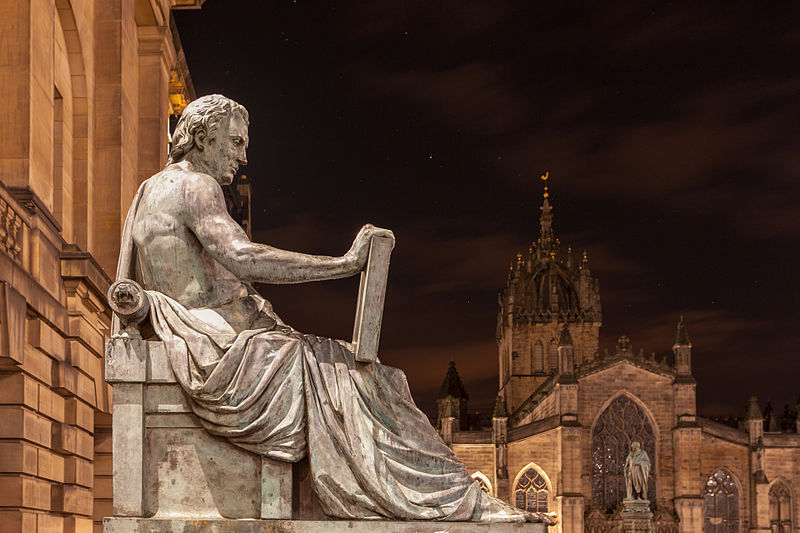A Short Guide for Reading David Hume's Dialogues Concerning Natural Religion (1779)
General Background and Biography
David Hume was one of the most significant philosophers of the eighteenth century, and scores of book and articles have been written about him and his work. It is easy to get overwhelmed if you try to do some background research on him. So, here are a few sources that will help you situate David Hume in context as well as help you understand what he was trying to do in his Dialogues Concerning Natural Religion.
To get started, it’s good to read a bit about his life. The Oxford Dictionary of National Biography is good for a short introduction. Unfortunately, you must have a subscription to use the database. For those who might have a strong background in philosophy, you might find the entry for Hume in the Stanford Encyclopedia of Philosophy useful. However, this resource is more helpful to those who have read some of Hume’s work and wish to have some of its arguments contextualized. The same is true for the Internet Encyclopedia of Philosophy.
I would recommend starting with the podcast, In Our Time With Melvyn Bragg, “David Hume”. According to the BBC,
Melvyn Bragg and his guests discuss the work of the philosopher David Hume. A key figure in the Scottish Enlightenment of the eighteenth century, Hume was an empiricist who believed that humans can only have knowledge of things they have themselves experienced. Hume made a number of significant contributions to philosophy. He saw human nature as a manifestation of the natural world, rather than something above and beyond it. He gave a sceptical account of religion, which caused many to suspect him of atheism. He was also the author of a bestselling History of England. His works, beginning in 1740 with A Treatise of Human Nature, have influenced thinkers from Adam Smith to Immanuel Kant and Charles Darwin, and today he is regarded by some scholars as the most important philosopher ever to write in English.
With: Peter Millican, Professor of Philosophy at the University of Oxford Helen Beebee , Professor of Philosophy at the University of Birmingham James Harris , Senior Lecturer in Philosophy at the University of St Andrews Producer: Thomas Morris.
In Our TIme should give you plenty of context to read Dialogues Concerning Natural Religion. But, if you would like to have some philosophical context for it, you might consider watching the discussion between Bryan McGee and John Passmore on David Hume (in five parts) available here:
http://youtu.be/M6v3ZYt08fY http://youtu.be/bpmBufGBW1Q http://youtu.be/VXS-HcBsHQ8 http://youtu.be/PYkMQultX9Y http://youtu.be/KmeC85cS_3s
The Text of Dialogues Concerning Natural Religion
Dialogues Concerning Natural Religion is widely available in print. I particularly like the Penguin edition and the Hackett edition, edited by Richard Popkin. It is also available online. Project Gutenberg has ebook versions available as well as an html version. If you are curious to read the published text against the original manuscript, you will want to visit davidhume.org.
Questions to Guide Your Reading
A short, lucid statement, Dialogues Concerning Natural Religion is an intellectually rich text which remains relevant today. Below are a few questions to get you started in your reading. In class, we will discuss them in detail, and I will help you understand the following terms.
a priori
a posteriori
inductive generalization
argument from analogy
argument from design
ontological argument
teleology
cosmological argument
General Questions
What does Hume mean by “Natural Religion” or “natural theology”?
Does Hume focus on “revealed” religion — i.e. revelation in the form of the “word of God”, visions, etc.?
Does any of the characters assume that God exists? Do any of the characters assume that God does not exist?
In their discussion of God, do any of the characters take the perspective of certain confession, for example, Christianity, Judaism, etc.?
In what ways do the characters discuss theology? through reason? logic? empiricism? experience, etc.?
What are the main arguments of each the three characters: Demea, Philo, and Cleanthes? Who is Pamphilus?
Why do you think that Hume put the treatise in the form of a dialogue?
Does Hume seem to give priority to one of the speakers? Does Hume seem to dismiss the arguments of any of the speakers?
What are the characters’ approaches to education?
What is skepticism, and how do each of the characters respond to it?
From what premises does each character argue about the nature of God? What are the main evidence that they use? What examples do they use?
How do the characters differ in their arguments about the using faith and/or reason to explore the nature of God? What are their methodologies?
